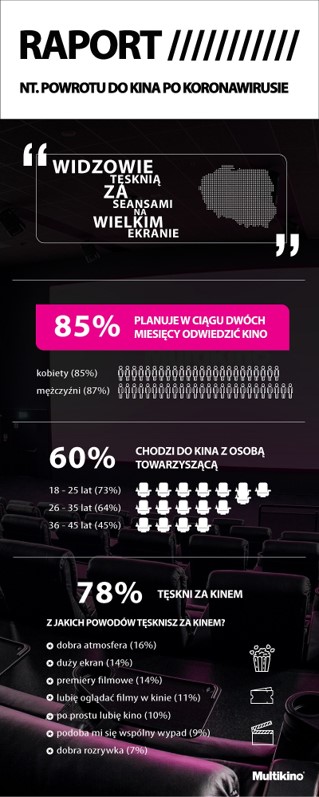
From March 12, all cinemas in Poland are closed until further notice. It’s been over two months of forced withdrawal from the magic of the big screen. It is not surprising then that Poles miss cinema. According to a survey carried out for the Multikino, 85% of respondents plan to visit cinema within two months. Out of every fifth declares that he will do it as soon as they open. The scale of longing is emphasized by the fact that for up to half of the respondents, cinema is the essential entertainment. Not only the film itself matters, but also the atmosphere and the fact that it is often a trip with friends or loved one: 60% go to the cinema with a companion.
These results are undoubtedly surprising. Especially when we compare them with declarations about going to pre-pandemic cinemas – according to TGI, only 28% of Poles declared that they visit cinemas once every two or three months or more often. In the group of people aged 16-49 this percentage increases, but “only” to the level of 34%. It means that either Poles “in captivity” fell in love with this form of entertainment, or that Multikino’s study was carried out on a not completely representative sample of “cinema fans”, e.g. their clients, whose data is in the mailing database of this network. Regardless of the arguments about the research methodology, however, it is clear that there is a great longing for cinema among the huge number of people. This is another example of how the subconscious, simplified inference rule influences our behaviour. In this case, the so-called reactance.
Reactance is nothing more than the subconscious, stubborn and often irrational pursuit of the freedom of choice taken away from us and the desire to decide for ourselves. As Ovidius used to say – Nitimur in vetitum semper cupimusque negata, meaning “we always strive for what is forbidden, and we want what is forbidden”. We were deprived of the opportunity to go to the cinema, so … the more we want to go there. Even if we were there the last time we were there with our classmates watching “Pan Tadeusz”. Reactance has a lot in common with another rule that shows how stubborn homo sapiens is – the rule of inaccessibility. According to it, we crave those goods which are scarcely or not at all. For example, in the case of promotions in online stores, we are informed that “the number of products at reduced prices is limited.” In the case of cinema in the era of COVID-19, the point is that if we can’t go to it, our brains declare even more that it is where they would like to go.

